| Srl | Item |
| 1 |
ID:
153911
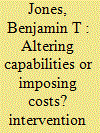

|
|
|
|
|
| Summary/Abstract |
How do military interventions affect the outcome of civil wars? The diversity of military interventions makes it difficult to answer this question; their variation means that they do not affect civil wars in a straightforward way. In particular, strategy and timing play a pivotal role in determining the effect of an intervention. Thus, I isolate three intervention strategies: indirect (bolstering the capabilities of the supported side), direct-conventional (degrading the capabilities of the opposition), and direct-unconventional (imposing costs on the opposition). I evaluate the impact of these strategies on the outcome of civil wars using a dataset of all civil wars from 1944 to 2007. My analysis reveals that the efficacy of intervention strategies varies over time. Third-party support for rebel organizations is most effective during a critical window early in a civil war. In contrast, direct military assistance for the government increases the odds of a government victory only once a civil war becomes protracted. It also reduces the odds of a negotiated outcome to the conflict, whereas indirect support for the government proves most effective early in the war. This work demonstrates that pooling all interventions together risks overlooking important differences in their effects on civil wars. It also carries with it important implications for states considering interventions in civil wars.
|
|
|
|
|
|
|
|
|
|
|
|
|
|
|
|
| 2 |
ID:
190434
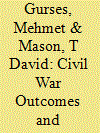

|
|
|
|
|
| Summary/Abstract |
While a growing body of research has highlighted a significant and positive relationship between negotiated peace agreements and postwar democratization, they have focused almost exclusively on a minimalist form of electoral democracy. We extend this analysis to consideration of how civil war outcomes affect egalitarian democracy, which measures the extent to which the regime incorporates (1) equal protection of rights and freedoms, (2) equal distribution of resources, and (3) equal access to power. We add V-Dem egalitarian democracy measures to the UCDP Conflict Termination dataset to determine whether civil war outcomes account for just the emergence of electoral democracy or whether they also affect the prospects for a more just and equitable society for citizens at the grassroots level. Our findings highlight the need to qualify the effect of modes of war termination on postwar democratization. Peace agreements are followed by higher levels of democratization than is the case with other civil war outcomes, but the effect on egalitarian democracy is more durable than the effect on electoral democracy.
|
|
|
|
|
|
|
|
|
|
|
|
|
|
|
|
| 3 |
ID:
140349
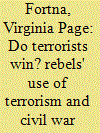

|
|
|
|
|
| Summary/Abstract |
How effective is terrorism? This question has generated lively scholarly debate and is of obvious importance to policy-makers. However, most existing studies of terrorism are not well equipped to answer this question because they lack an appropriate comparison. This article compares the outcomes of civil wars to assess whether rebel groups that use terrorism fare better than those who eschew this tactic. I evaluate the advantages and disadvantages of terrorism relative to other tactics used in civil war. Because terrorism is not a tactic employed at random, I first briefly explore empirically which groups use terrorism. Controlling for factors that may affect both the use of terrorism and war outcomes, I find that although civil wars involving terrorism last longer than other wars, terrorist rebel groups are generally less likely to achieve their larger political objectives than are nonterrorist groups. Terrorism may be less ineffective against democracies, but even in this context, terrorists do not win.
|
|
|
|
|
|
|
|
|
|
|
|
|
|
|
|
| 4 |
ID:
165266


|
|
|
|
|
| Summary/Abstract |
New research has begun to underscore the complicated relationship between democratic institutions and the duration of civil wars. Specifically, greater constraints placed on executives often lead to considerably longer civil wars as leaders are limited in how they bargain with dissidents. This presents a puzzle as democracies are often seen as credible negotiators in international disputes. This article suggests that the size of the government’s winning coalition represents a double-edged sword. Larger winning coalitions allow governments to bargain more credibly but also place constraints on what governments can offer since peace agreements may alienate coalition members. Fortunately, future access to postwar oil wealth provides the feasibility for the governments to compensate hard-liners who may lose out on any settlement, making them more likely to allow concessions to rebels. This combined credibility of large winning coalitions and the feasibility provided by oil wealth allows for peace agreements, therefore shortening the duration of civil wars. We test these propositions by examining the conditional relationship between oil wealth and coalition size on the duration of all civil wars between 1950 and 2009.
|
|
|
|
|
|
|
|
|
|
|
|
|
|
|
|
| 5 |
ID:
185075
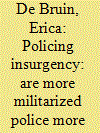

|
|
|
|
|
| Summary/Abstract |
Is militarized policing an effective way to combat insurgency? This article uses new global data on policing practices to evaluate whether states with militarized police perform better than those without them. The analysis provides no evidence that militarized police are an asset in counterinsurgency. Indeed, states with militarized units within their national or federal-level police are generally less likely to achieve favorable counterinsurgency outcomes. In explaining these findings, the article emphasizes that while militarization provides police with greater coercive capacity, it also impedes information collection and contributes to indiscriminate violence that can fuel additional dissent.
|
|
|
|
|
|
|
|
|
|
|
|
|
|
|
|
| 6 |
ID:
115205
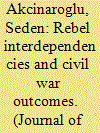

|
|
|
|
|
| Publication |
2012.
|
| Summary/Abstract |
The article investigates how rebel interdependencies shape civil war outcomes. The author argues that alliances between rebel groups will have serious repercussions on the management of conflict. By examining civil war outcomes between 1946 and 2008, the author shows that the presence of multiple groups, alliances among rebels, the cumulative capabilities of one's allies as well as the credibility and the durability of alliances shape war outcomes. Rebels have the means to avoid government defeat and continue conflict when the number of rebel groups the government has to confront simultaneously is high or when these groups cooperate against their common enemy. Findings show that while termination by peace agreement is unlikely for allied rebels, specifically for those that have enduring relationships, rebels with access to high levels of ally capabilities along with those who have credible alliance ties are likely to be the victors of war.
|
|
|
|
|
|
|
|
|
|
|
|
|
|
|
|